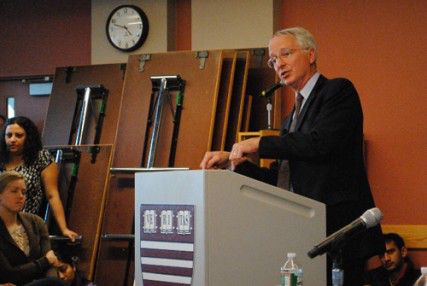
The U.S. Ambassador to Pakistan Cameron Munter said the United States promised too much to Pakistan while discussing foreign relations.
During his lecture at Harvard Kennedy School on Monday, Munter said he endured as the ambassador to Pakistan through major crises.
“We over-promised, not because we meant to over-promise,” Munter said, “but because there was so much of an effort to build a strategic relationship, from issues like water to the role of women in the country.”
Munter said he guided Pakistan during crises and “a series of disasters,” including the capture of Osama bin Laden and the Afghan war end game, all while leading a 2,500-employee embassy.
There was a contradiction, he said, of America’s long-term and short-term goals.
“In the long-term we have a commitment to stability and parallel processes to efforts in Pakistan,” Munter said, “but on the short-term we focus on counter-terrorism.”
It is important to understand Pakistani society is distinguishable from the Pakistani state, Munter said.
“Pakistani society is like a ship that sometimes can’t go forward and it can’t go backward, but it can’t sink,” Munter said. “It is resilient.”
Munter also talked about the intelligence aspect of the U.S.-Pakistani relationship.
“The CIA-ISI relationship is still cooperative,” Munter said. “The Pakistani government realizes that we have a lot in common on counter-terrorism and we still have a decent relationship with the intelligence.”
But this may change when Pakistan’s Director General of Inter-Services Intelligence, Lt. Gen. Ahmad Shuja Pasha, announces his retirement, which is predicted to be around March 18, Munter said.
He said the “military-military relationship has taken a beating,” referring to Pakistan’s Chief of Army Staff Gen. Ashfaq Parvez Kayani’s dismissal of American personnel.
Munter said when military aid was limited because of the incident he told Kayani “when trainers go, equipment has to go to. If you get rid of the boys, then you have to get rid of the toys. He said, ‘I understand.’”
Deep down, he said, Pakistani politicians do not want Americans to go away.
“What they want is partnership and a better sense of respect, “ Munter said. “We need to expand to get them out of a certain narrative they have created about the U.S. We have to be less arrogant.”
Munter said it was imprudent to ask if Pakistan loves America or vice versa.
“Talk about concrete things we can do together,” Munter said. “Like the American philosopher Tina Turner asked, ‘What’s love got to do with it?’”
Filiz Otucu, an associate professor of political science and international studies at Plymouth State University, said he liked Munter’s comment on the Pakistani-American diaspora and how it can play a role in “building the bridge” again.
“I think it’s very important, especially for this audience to hear, and I’m hoping that there will be concrete steps taken to make this have more value,” Otucu said.
Otucu said the United States is hearing a negative attitude toward American foreign policy because people are hurting.
“It needs to be changed,” Otucu said.
Marina Svabic, a Harvard University graduate student who had met Munter earlier during his time in Serbia said he was candid and cautious when talking about why the U.S. had failed in Pakistan.
“This was probably very useful for Pakistani-American relations,” Svabic said. “I think he’s the best man for the job.”
Laila Kasuri, an engineering student at Harvard College, said there should be more student involvement. She said she worked on a water task force as part of a summer project with one of her professors.
“One important thing to note is that it’s only through universities through here that you can get an opportunity to work in the higher cadres of government in Pakistan,” Kasuri said. “There should actually be an action plan,” Kasuri said.
This is an account occasionally used by the Daily Free Press editors to post archived posts from previous iterations of the site or otherwise for special circumstance publications. See authorship info on the byline at the top of the page.



